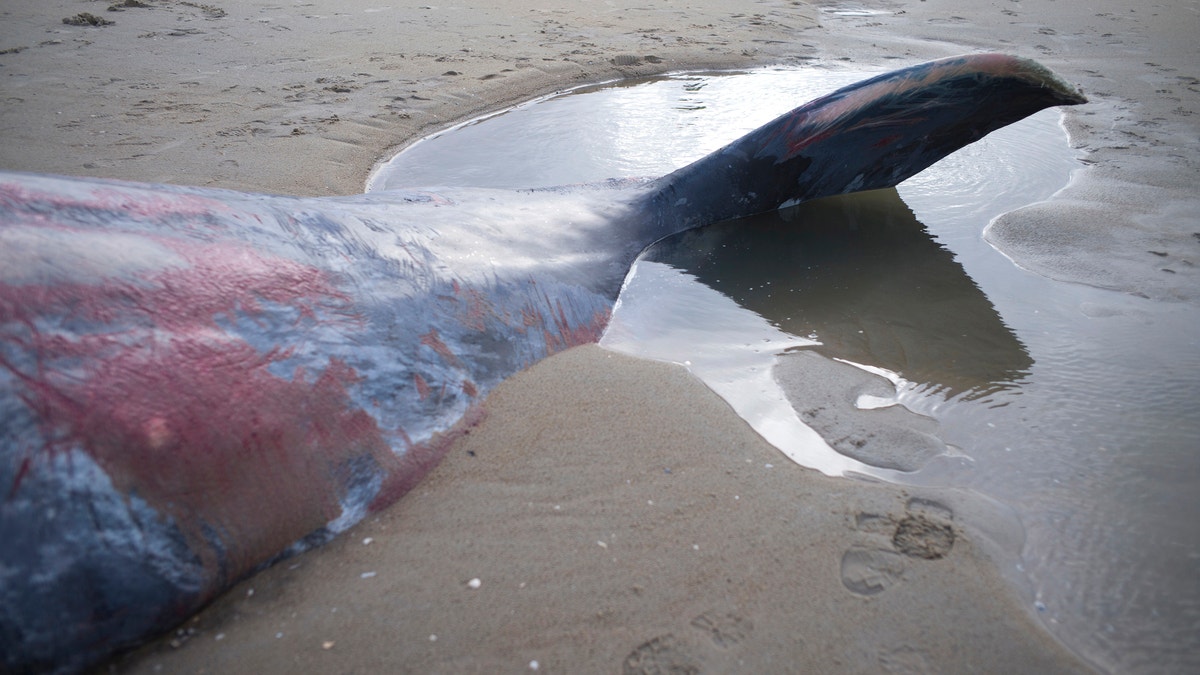
The tail of a dead sperm whale is seen on a beach on Texel Island, The Netherlands, January 13, 2016. (REUTERS/Cris Toala Olivares)
Scientists were appalled to find 64 pounds of garbage and plastic -- including bags, ropes, nets and even a drum -- inside the stomach of a young sperm whale that recently washed up on a beach in Spain.
The 6-ton, 33-foot-long creature was discovered near a lighthouse in Cabo de Palos in the region of Murcia on Feb. 27, the regional government said in a statement last week. A necropsy revealed it was killed by "gastric shock" to its stomach and intestines after ingesting the trash, marine experts told The Telegraph.
"Experts found the inner walls of the whale's abdomen to be inflamed due to a bacterial or fungal infection," the British newspaper reported. "This is likely a result of the whale unable to expel the plastics from its system, resulting in peritonitis."
"The presence of plastics in seas and oceans is one of the greatest threats to the conservation of wildlife throughout the world..."
Officials said the dead whale is just the latest example of the troubling effect pollution is having on the world's oceans, and urged residents to clean up after themselves.
BLUE WHALE CARCASS CARVED INTO, STOMPED ON BY TOURISTS TAKING SELFIES
"The presence of plastics in seas and oceans is one of the greatest threats to the conservation of wildlife throughout the world, as many animals are trapped in the trash or ingest large amounts of plastics that end up causing death," Consuelo Rosauro, the local government's general director of natural environment, said in an online statement.
The sperm whale, which feeds almost exclusively on squid and has an average lifespan of 70 years, is protected under the Spanish Catalogue of Endangered Species as well as the U.S. Endangered Species Conservation Act.
Pollution is problematic for the environment and humans, but it's especially troubling for marine life, like the sperm whale.
A 2014 study published in a Public Library of Science journal revealed there's a minimum of 5 trillion pieces of plastic (weighing 268,940 tons) in our world's oceans -- and that number is only expected to grow.
A "floating" island of trash, dubbed the Great Pacific Garbage Patch (GPGP), stretches 600,000 square miles across the Pacific Ocean, according to a study published in Scientific Reports in late March. It's more than twice the size of Texas (three times the size of France).
SCIENTISTS OBSERVE MALE ORCA KILL CALF IN FIRST-OF-ITS-KIND DISCOVERY
The size of the trash pile has nearly doubled in size since October 2016, containing at least 79,000 tons of plastic — "a figure four to 16 times higher than previously reported," Scientific Reports said.
"We must tackle [this problem] through clean-up actions and, above all, awareness of citizens," Rosauro suggested.
In response to the whale's death, the government of Murcia is launching a campaign to combat ocean waste and protect what officials call "priority species," including the sperm whale, bottlenose dolphin, gray pilot whale and loggerhead turtle, among others.
"The awareness campaign includes eleven actions to clean beaches, using the protocol of action of 'Ocean Conservancy', which allows obtaining data on the type and quantity of marine litter," the government explained, adding that officials will give nearly 20 presentations on the topic spread throughout the year.



















